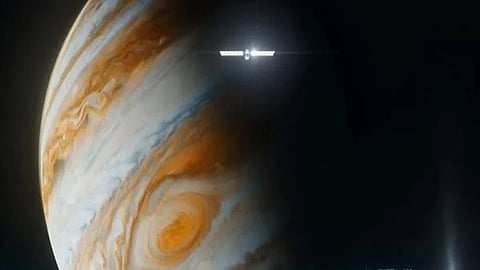

New research from Rice University suggests that Jupiter played a decisive role in protecting Earth by preventing it from spiralling into the Sun during the Solar System’s early years.
The study, based on advanced simulations, shows that Jupiter’s rapid formation and immense gravity disrupted the flow of gas and dust around the young Sun, shaping the environment in which Earth and other rocky planets later formed.
According to the researchers, Jupiter grew quickly and became massive enough to stir the protoplanetary disc of gas and dust. This disturbance carved out a huge gap in the disc, effectively dividing the Solar System into inner and outer regions, The Indian Express reports.
By blocking material from flowing inward, Jupiter stopped large amounts of gas and debris from being pulled into the Sun. This stabilised the inner region and made it possible for smaller, rocky planets like Earth, Venus and Mars to form and remain in stable orbits.
Co-lead researcher Andre Izidoro explained that Jupiter’s early expansion “set the architecture for the whole inner Solar System.” Without this gravitational barrier, he said, the material that eventually became Earth and its neighbouring planets might never have gathered in a safe orbit.
The study also helps explain another long-standing mystery about meteorites. The researchers found that Jupiter’s presence separated materials with different isotopic compositions, which led to the formation of distinct types of meteorites.
Graduate student Baibhav Srivastava, who was also part of the research team, noted that this separation allowed some chondritic meteorites to form two to three million years after the first solids appeared in the Solar System.
